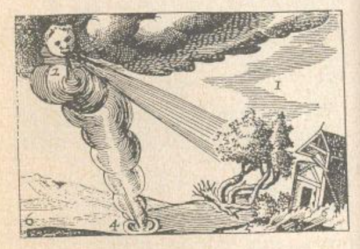Justin E. H. Smith in his Substack newsletter Hinternet:
 What is weather? Its etymology is not, as one may have hoped, connected to “whether”, as in “that which may be either one way, or the other” —“Whether the picnic is on or not depends on whether it rains”—, though both words have equally fascinating Germanic pedigrees. The modern German Wetter originally described the sort of ferocious wind you might encounter at a mountain peak, and later took on the primary connotation of “bad weather”, or, as is said in German, Unwetter, where the prefix that ordinarily signifies negation or absence, Un-, comes instead to indicate intensification (as in Untier — seemingly “non-animal” but literally “monster”, or Unkraut — seemingly “non-herb” but literally “weed”). At the outset then we may say that weather, strangely, is something the negative instances of which are also its paradigm instances. Yet the German and English words for “weather” are outliers among European languages, while far more commonly the term that is used is the same as the word for “time”: French le temps, Romanian timpul (or the variant Slavic-rooted vremea); even the Finno-Ugric pocket of Hungary calls both time and weather by the same word: idő. Already from this lexical tour we may infer that at some earlier stage what we today call “weather” was conceptualized primarily in a phenomenological sense, as the most basic experience of “in-the-world-ness”. Yet the overlapping history of these two concepts, time and weather, should only make us wonder at the profoundly different connotations each would come to have in late modernity.
What is weather? Its etymology is not, as one may have hoped, connected to “whether”, as in “that which may be either one way, or the other” —“Whether the picnic is on or not depends on whether it rains”—, though both words have equally fascinating Germanic pedigrees. The modern German Wetter originally described the sort of ferocious wind you might encounter at a mountain peak, and later took on the primary connotation of “bad weather”, or, as is said in German, Unwetter, where the prefix that ordinarily signifies negation or absence, Un-, comes instead to indicate intensification (as in Untier — seemingly “non-animal” but literally “monster”, or Unkraut — seemingly “non-herb” but literally “weed”). At the outset then we may say that weather, strangely, is something the negative instances of which are also its paradigm instances. Yet the German and English words for “weather” are outliers among European languages, while far more commonly the term that is used is the same as the word for “time”: French le temps, Romanian timpul (or the variant Slavic-rooted vremea); even the Finno-Ugric pocket of Hungary calls both time and weather by the same word: idő. Already from this lexical tour we may infer that at some earlier stage what we today call “weather” was conceptualized primarily in a phenomenological sense, as the most basic experience of “in-the-world-ness”. Yet the overlapping history of these two concepts, time and weather, should only make us wonder at the profoundly different connotations each would come to have in late modernity.
More here.
